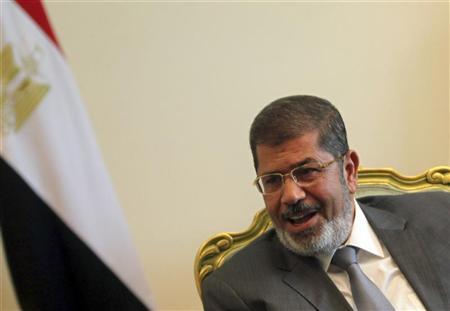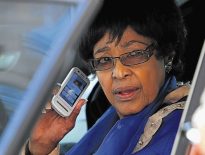(Reuters) – In decades of furtive meetings in tea houses, mosques and universities, members of Egypt’s underground Muslim Brotherhood spoke ardently of a country governed by Islamic law. Now that their debates take place in parliament and the presidential palace, they must decide how far to go in bringing it about.

Elections held since the fall of Hosni Mubarak have turned the once-banned Brotherhood and its allies into the dominant political force in the Arab world’s most populous country.
That success has left the Brotherhood facing competing pressures – on the one hand, to satisfy the conservative Islamists who supported them at the polling station, while on the other hand to avoid conflict with secular-minded Egyptians and a potent military establishment that opposes radical change.
For now, the outcome appears to be a compromise, satisfying neither side entirely but avoiding major confrontation, with the aim of giving the Brotherhood the leeway to meet the needs of running a modern state.
“Everything is a subject of compromise and negotiation for the Brotherhood,” said Khalil al-Anani, an expert on Islamist movements based at Durham University in England.
“It realizes that limiting personal freedoms will endanger their political gains,” he said. “At the same time, they will have to satisfy conservative sections of society.”
The Brotherhood’s move into public life frightens secular-minded Egyptians, who fear Islamist curbs could lead to dress codes, kill off music and cinema or force men and women to segregate in public. Christians, a tenth of Egyptians, are particularly worried, despite Mursi’s attempts at outreach.
Businesses fear for the impact on a tourism industry that creates one in eight jobs.
A call put out on Facebook for a march in defense of beer – first produced in Egypt in pharaonic times – captured a mood of defiance among some after the Brotherhood’s Mohamed Mursi won the presidency.
While Mursi has promised to protect freedoms, his campaign was also peppered with promises to implement sharia, the Islamic law code.
“The fear is of destroying the civil state in which citizens are equal… The reassurance message is valueless, because we are seeing what they are doing in reality,” said Refaat el-Saeed, head of Tagammu leftist Party.
Some Egyptians worry that even without direction from the state, zealots emboldened by the Islamists’ ballot box success could seek to impose their will in the street. Those fears appeared to be manifested in the days following Mursi’s election, when a group of three men stabbed a young man to death for going out with his fiancée in the city of Suez.
Ahmed Eid was killed by three young men who have been charged with forming an illegal vigilante group to “fight vice and promote virtue”.
The Brotherhood denies that it is behind such attacks and has accused agents loyal to Mubarak’s old order of trying to tar it with the same brush by sending youths masquerading as Brotherhood members to threaten hair salons.
There are limits to how far the Brotherhood can go in transforming Egyptian society.
Founded in 1928 by urban intellectuals and run by engineers, teachers and doctors, the Brotherhood says it does not want a theocracy – something which in any case the military council has signaled it will not allow to come about.
“I don’t think anyone, even if he has a 40-year term rather than a four-year term, will have the ability to change society, such that the sharia is implemented with all its comprehensive aspects,” said Ahmad Ahmad, an associate professor of religious studies at Harvard University in the United States.
JUDGED ON ECONOMY
The Brotherhood is keenly aware that Egyptians will judge it first and foremost by its ability to resolve their deep economic problems and alleviate poverty. That provides a strong incentive to avoid measures that frighten off tourists or hurt commerce.
Rather than emphasize the ancient proscriptions of Islamic law, Brotherhood members describe sharia as a pragmatic moral code that can be used by a modern society to promote reform.
“Wherever you find benefit for society, then that is God’s law,” said Sheikh Abdul Rahman al-Barr, a cleric who sits on the Brotherhood’s executive board.
He said Mursi would be applying sharia by ending corruption and cronyism in government, ending police abuses such as torture and eavesdropping, and enforcing traffic laws.
There would be no imposition of dress codes, he said, pointing to the growth in the numbers of Egyptian women voluntarily wearing headscarves as proof that coercion was unnecessary. Tourists need not fear for their beach wear, as resorts would be treated as places with a “special context”.
The Brotherhood has been similarly pragmatic on the imposition of bank interest, which many scholars say is forbidden in Islam but will not be abolished in Egypt.
Even the more hardline Islamist groups, or Salafi movements, that have moved into public life in the last year have started to strike a similarly pragmatic tone.
Al-Gama’a al-Islamiya, a Salafi group that took up arms against the state as recently as the 1990s, now speaks of a sharia that brings justice, fights corruption and prevents torture and unlawful detention.
“These are the priorities of the sharia as I see them today,” said Tareq El-Zumor, who spent 30 years in jail for involvement in the killing of former president Anwar Sadat.
ISSUES OF “PRIDE”
Kamal Habib, a former al-Gama’a al-Islamiya member and an expert on Islamist groups, said Salafi views had evolved as they moved into mainstream politics during parliamentary elections that began in November last year.
“When the Salafis were campaigning in the election, they spoke of sharia as an immediate step, but as they came closer to power they modified their position as they found a lot of serious complications in society.”
Still, Islamists are trying to make substantial changes, especially in areas that are seen as a matter of pride for their conservative followers.
In the first few months of the parliament’s work, newly-elected Salafi lawmakers pressed for an end to a woman’s right to seek divorce, to adjust custody laws in favor of men and to toughen the punishment for insulting religion.
All of those proposals were raised independently of any party and none made it into law.
Barr, the Brotherhood cleric, forecast legislation that would eventually ban Muslims from trading or producing alcohol, while permitting its production and sale to non-Muslims.
The role of Islamic law in Egypt’s new constitution has become a defining issue.
“I am afraid of leaving the constitution in the hands of people who think in this way,” said Shahata Mohamed Shahata, a lawyer fiercely opposed to Brotherhood rule who filed a lawsuit demanding the dissolution of the body writing the document.
One proposal would add language making God the source of sovereignty. Another would give Al-Azhar, a religious school founded in Cairo more than 1,000 years ago, an official role as the body that would interpret Islamic law.
“It’s a big step – to put Al-Azhar in the constitution that is supposed to last for generations,” said Anani of Durham University. “What if Al-Azhar’s interpretation is regressive and not in favour of democracy?”
But he forecast more compromise ahead by the Brotherhood: “The Brotherhood will do everything for the sake of power. So they might cross the ideological red lines for political gains.”
(Writing by Tom Perry; Editing by Peter Graff)





